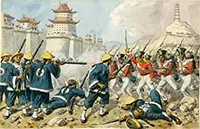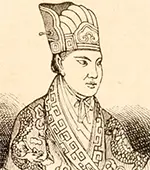The Taiping Rebellion
The Taiping Rebellion was a devastating civil war that consumed Qing Dynasty China for a decade and a half. The death toll has been estimated to have been in the tens of millions. China in the 19th Century was a large, sprawling empire that clung to Confucian ideals and other traditional belief and governmental systems. Through the centuries, China had long been the powerhouse of Asia, boasting a very large economy, a large-scale trade network, a very large army, at one time the world's largest fleet, and a knack for invention. One thing that a long series of Chinese emperors had not done was embrace industrialization or modernization. Some Qing Dynasty emperors did, but they were the exceptions. This showed in a glaring way when Chinese Into this maelstrom stepped the ambitious, controversial figure of Hong Xiuquan, who rose to great heights of fame in leading an insurrection. Hailing from a poor village in the province of Guangdong, he, like millions of people before and after him, wanted to get a job in In 1844, Hong took his message far and wide, finding rapt audiences in the farmers and peasants who had been dispossessed by a combination of wars and natural disasters. The movement grew, and Hong's influence and notoriety spread throughout the empire. He declared himself the Heavenly King of that Heavenly Kingdom of Peace in 1851. By that time, the movement had gained a large number of followers, many of whom carried weapons. Qing armies had assembled to confront the growing number of Taipings, as many sources call them. 
Hong led his forces north, taking control of large amounts of territory along the way, and in 1853 captured the city of Nanjing, the onetime capital. He declared the city the Heavenly Capital of his kingdom. Qing armies pursued, taking back some territory after fierce struggles. The main force fighting for the emperor at this time was the Xiang Army, led by Zeng Guofan. This army took back province after province, pursuing the Taipings all the way to Nanjing. In 1860, the Taipings attacked Shanghai but did not secure it. By this time, representatives of a few European powers had shaken off their professions of neutrality and sided with the emperor. The two sides traded victories for a time, then the Taipings tried again for Shanghai, in 1862; again, they were repulsed. Meanwhile, the Qing siege of Nanjing continued. Hong Xiuaquan died of food poisoning in 1864. He had already abdicated to make way for his oldest son, 15-year-old Hong Tianguifu. The son had none of his father's magnetism or strategic bent and was himself captured in late 1864. That same year, Qing forces took Nanjing. 
With the Heavenly King gone and the capital of the Heavenly Kingdom taken, the Taiping Rebellion was largely toothless. It still had a large number of adherents, however, and Qing armies spent another handful of years rooting out the remaining rebels. It wasn't until 1871 that the final Taiping sympathizers surrendered. By that time, the Qing government had lost the Second Opium War. All told, the number of dead and injured during the Taiping Rebellion was in the tens of millions. Sources differ, sometimes wildly, on how many on each side were casualties. The fighting devastated much land, farm and otherwise, forcing China to again rebuild and renew. |
|
Social Studies for Kids
copyright 2002–2024
David White



 armies and navies were badly beaten in the
armies and navies were badly beaten in the  government and so took the difficult civil service examination. He did not pass. He took the exam four times in all and did not pass at all. After the fourth time, he fell ill. During his illness, he said that he experienced a mystical vision. Not long afterward, he declared that he was the younger brother of Jesus, the founder and namesake of the Christian religion. Further, Hong claimed that it was his divine responsibility to root out the demons of the earth and usher in what he called the Heavenly Kingdom of Peace. Among those "demons" were the Qing emperor and his leaders. Thus began the insurrection. From the Chinese word for "Great Peace" came the word Taiping; thus, the insurrection came to be known as the Taiping Rebellion.
government and so took the difficult civil service examination. He did not pass. He took the exam four times in all and did not pass at all. After the fourth time, he fell ill. During his illness, he said that he experienced a mystical vision. Not long afterward, he declared that he was the younger brother of Jesus, the founder and namesake of the Christian religion. Further, Hong claimed that it was his divine responsibility to root out the demons of the earth and usher in what he called the Heavenly Kingdom of Peace. Among those "demons" were the Qing emperor and his leaders. Thus began the insurrection. From the Chinese word for "Great Peace" came the word Taiping; thus, the insurrection came to be known as the Taiping Rebellion.
